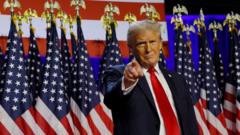As Trump's administration takes shape, his chosen cabinet members are igniting controversy and discussions about their qualifications and policy backgrounds.
Trump's Cabinet Filled with 'Disruptors,' According to GOP Leadership

Trump's Cabinet Filled with 'Disruptors,' According to GOP Leadership
House Speaker Mike Johnson highlights President-elect Trump's unconventional choices for key administration roles as 'status quo disruptors.'
In a recent interview on CNN’s State of the Union, House Speaker Mike Johnson described President-elect Donald Trump's cabinet picks as "disruptors" aimed at reshaping the political landscape. Johnson emphasized that these selections are meant to challenge the established norms within Washington. Trump is continuing to announce high-level positions, primarily favoring close allies over individuals with extensive policy expertise.
The implications of these appointments have sparked concern across party lines, as several nominees have been embroiled in scandals. For example, Trump’s choice for defense secretary, Pete Hegseth, is facing a sexual assault allegation, and potential attorney general Matt Gaetz is under investigation for ethics breaches. Similarly, Robert F. Kennedy Jr. nominated for health secretary, has generated discontent due to his position on vaccines.
Trump's son, Donald Trump Jr., defended the controversial appointments during a Fox News interview, asserting that the goal is to surround his father with competent and loyal advisors. He acknowledged that the nominees might face scrutiny but seemed confident in the vetting process, stating that alternative plans are in place should any nominee struggle to gain Senate approval. “We’re going with the strongest candidates first,” he noted, emphasizing that the nominees’ effectiveness may come at a cost of contention.
Additionally, Trump’s newest nominee for energy secretary, oil executive Chris Wright, has stirred fears among environmentalists due to his lack of government experience and promotion of fossil fuels. This nomination coincides with President Joe Biden’s groundbreaking visit to the Amazon rainforest, where he reiterated his commitment to addressing climate change and securing financial support for conservation efforts.
While Biden’s administration champions clean energy initiatives, Trump’s cabinet selections reflect a stark contrast, with the potential to redefine the U.S. approach to energy production and environmental policy. The divergent paths of these two administrations underscore the ongoing debate regarding the future of America's climate policies and the energy sector.
The implications of these appointments have sparked concern across party lines, as several nominees have been embroiled in scandals. For example, Trump’s choice for defense secretary, Pete Hegseth, is facing a sexual assault allegation, and potential attorney general Matt Gaetz is under investigation for ethics breaches. Similarly, Robert F. Kennedy Jr. nominated for health secretary, has generated discontent due to his position on vaccines.
Trump's son, Donald Trump Jr., defended the controversial appointments during a Fox News interview, asserting that the goal is to surround his father with competent and loyal advisors. He acknowledged that the nominees might face scrutiny but seemed confident in the vetting process, stating that alternative plans are in place should any nominee struggle to gain Senate approval. “We’re going with the strongest candidates first,” he noted, emphasizing that the nominees’ effectiveness may come at a cost of contention.
Additionally, Trump’s newest nominee for energy secretary, oil executive Chris Wright, has stirred fears among environmentalists due to his lack of government experience and promotion of fossil fuels. This nomination coincides with President Joe Biden’s groundbreaking visit to the Amazon rainforest, where he reiterated his commitment to addressing climate change and securing financial support for conservation efforts.
While Biden’s administration champions clean energy initiatives, Trump’s cabinet selections reflect a stark contrast, with the potential to redefine the U.S. approach to energy production and environmental policy. The divergent paths of these two administrations underscore the ongoing debate regarding the future of America's climate policies and the energy sector.





















